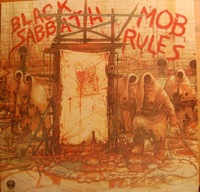Difference between revisions of "Mob"
(Created page with 'File:lighterstill.jpgright|frame '''Ochlocracy''' (Greek: οχλοκρατία or okhlokratía; Latin: ochlocratia) or ''mob ru...') |
m (Text replacement - "http://" to "https://") |
||
| Line 2: | Line 2: | ||
| − | '''Ochlocracy''' ([[Greek]]: οχλοκρατία or okhlokratía; [[Latin]]: ochlocratia) or ''mob rule'' is [[government]] by mob or a mass of people, or the intimidation of [[legitimate]] [[authorities]]. As a pejorative for [ | + | '''Ochlocracy''' ([[Greek]]: οχλοκρατία or okhlokratía; [[Latin]]: ochlocratia) or ''mob rule'' is [[government]] by mob or a mass of people, or the intimidation of [[legitimate]] [[authorities]]. As a pejorative for [https://en.wikipedia.org/wiki/Majoritarianism majoritarianism], it is akin to the [[Latin]] phrase mobile vulgus [[meaning]] "the fickle crowd", from which the [[English]] term "mob" was originally derived in the 1680s. |
| − | Ochlocracy ("rule of the general [[populace]]") is [[democracy]] ("rule of the people") spoiled by [ | + | Ochlocracy ("rule of the general [[populace]]") is [[democracy]] ("rule of the people") spoiled by [https://en.wikipedia.org/wiki/Demagoguery demagoguery], "[[tyranny]] of the [[majority]]" and the rule of [[passion]] over [[reason]], just like oligocracy ("rule of a few") is [[aristocracy]] ("rule of the best") spoiled by [[corruption]]. Ochlocracy is synonymous in [[meaning]] and usage to the modern, informal term "Mobocracy," which emerged from a much more recent colloquial etymology. |
==Terminology== | ==Terminology== | ||
| − | The term appears to have been coined by [ | + | The term appears to have been coined by [https://en.wikipedia.org/wiki/Polybius Polybius] in his [https://en.wikipedia.org/wiki/The_Histories_(Polybius) Histories] (6.4.6).[2] He uses it to name the 'pathological' version of [[popular]] rule in [[opposition]] to the [[good]] version, which he refers to as [[democracy]]. There are numerous mentions of the [[word]] "ochlos" in the [https://en.wikipedia.org/wiki/Talmud Talmud] (where "ochlos" refers to anything from "mob," "populace" to "armed guard"), as well as in [https://en.wikipedia.org/wiki/Rashi Rashi], a Jewish commentary on the [[Bible]]. The [[word]] is recorded in [[English]] since 1584, derived from the French ochlocratie (1568), which stems from the original [[Greek]] ''okhlokratia'', from ''okhlos'' "mob" and kratos "rule, [[power]], [[strength]]" |
| − | In [ | + | In [https://en.wikipedia.org/wiki/Ancient_Greece ancient Greek] [[political]] [[thought]] ochlocracy was considered as one of the three "bad" [[forms]] of [[government]] ([[tyranny]], oligarchy and ochlocracy) as [[opposed]] to the three "good" forms of government (monarchy, [[aristocracy]] and [[democracy]]). The distinction between "good" and "bad" was made according to whether the [[government]] form would act in the interest of the whole [[community]] ("good") or special interests ("bad"). |
An ''ochlocrat'' is one who is an advocate or partisan of ochlocracy. It can also be used as an adjective (ochlocratic or ochlocratical). | An ''ochlocrat'' is one who is an advocate or partisan of ochlocracy. It can also be used as an adjective (ochlocratic or ochlocratical). | ||
| − | The threat of "mob rule" to a [[democracy]] is restrained by ensuring the rule of [[law]] protects [[minorities]] or [[individuals]] against short-term [ | + | The threat of "mob rule" to a [[democracy]] is restrained by ensuring the rule of [[law]] protects [[minorities]] or [[individuals]] against short-term [https://en.wikipedia.org/wiki/Demagoguery demagoguery] or [[moral]] panic.[https://en.wikipedia.org/wiki/Ochlocracy] |
[[Category: Political Science]] | [[Category: Political Science]] | ||
Latest revision as of 02:37, 13 December 2020
Ochlocracy (Greek: οχλοκρατία or okhlokratía; Latin: ochlocratia) or mob rule is government by mob or a mass of people, or the intimidation of legitimate authorities. As a pejorative for majoritarianism, it is akin to the Latin phrase mobile vulgus meaning "the fickle crowd", from which the English term "mob" was originally derived in the 1680s.
Ochlocracy ("rule of the general populace") is democracy ("rule of the people") spoiled by demagoguery, "tyranny of the majority" and the rule of passion over reason, just like oligocracy ("rule of a few") is aristocracy ("rule of the best") spoiled by corruption. Ochlocracy is synonymous in meaning and usage to the modern, informal term "Mobocracy," which emerged from a much more recent colloquial etymology.
Terminology
The term appears to have been coined by Polybius in his Histories (6.4.6).[2] He uses it to name the 'pathological' version of popular rule in opposition to the good version, which he refers to as democracy. There are numerous mentions of the word "ochlos" in the Talmud (where "ochlos" refers to anything from "mob," "populace" to "armed guard"), as well as in Rashi, a Jewish commentary on the Bible. The word is recorded in English since 1584, derived from the French ochlocratie (1568), which stems from the original Greek okhlokratia, from okhlos "mob" and kratos "rule, power, strength"
In ancient Greek political thought ochlocracy was considered as one of the three "bad" forms of government (tyranny, oligarchy and ochlocracy) as opposed to the three "good" forms of government (monarchy, aristocracy and democracy). The distinction between "good" and "bad" was made according to whether the government form would act in the interest of the whole community ("good") or special interests ("bad").
An ochlocrat is one who is an advocate or partisan of ochlocracy. It can also be used as an adjective (ochlocratic or ochlocratical).
The threat of "mob rule" to a democracy is restrained by ensuring the rule of law protects minorities or individuals against short-term demagoguery or moral panic.[1]
